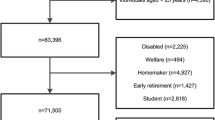Abstract
Previous research has typically failed to support the plausible expectation that lower psychological well-being accompanies longer unemployment. Two cohorts of recent school-leavers were interviewed over two years, and five data sets were available for investigation. Measures of both psychological distress and self-esteem were found to be uncorrelated with duration of unemployment for young men. For young women no relationships with self-esteem were observed, and in one cohort longer female unemployment was associated with lower distress. This was shown to be due to women's withdrawal from the labour market because of pregnancy and child care. It is suggested that the expected association between duration and well-being may be restricted to older samples and longer periods out of work.
Similar content being viewed by others
References
Bachman, J. G. & O' Mailley, P. M. (1977). Self -esteem in young men: a longitudinal analysis of the impact of educational and occupational attainment. Journal of Personality and Social Psychology, 35, 365–380.
Bakke, E.W. (1940). Citizens without Work. New Haven, CT: Yale University Press.
Banks, M.H. (1982). Validation of the General Health Questionnaire in a young community sample. Psychological Medicine, in press.
Banks, M.H. & Jackson, P.R. (1982). Unemployment and risk of minor psychiatric disorder in young people: cross-sectional and longitudinal evidence. Psychological Medicine, 12, 789–798.
Beales, H.L. & Lambert, R.S. (1934) Memoirs of the Unemployed. London: Gollancz.
Cobb, S. & Kasl, S.V. (1977). Termination: The Consequences of Job Loss. Cincinnati, OH: US Department of Health Education and Welfare.
Cohn, R. M. (1978). The effect of employment status change on self-attitudes. Social Psychology, 41, 81–93.
Eisenberg, P. & Lazarsfeld, P.F. (1938). The psychological effects of unemployment. Psychological Bulletin, 35, 358–390.
Feather, N.T. & Davenport, P.R. (1981). Unemployment and depressive affect: a motivational analysis. Journal of Personality and Social Psychology, 41, 422–436.
Goldberg, D. (1972). The Detection of Psychiatric Illness by Questionnaire. London: Oxf ord University Press.
Goldberg, D. ( 1978). Manual f or the General Health Questionnaire. Windsor: NFER.
Goldberg, D. (1981). Estimating the prevalence of psychiatric disorder from the resul ts of a screening test. In J. K. Wing, P. Bebbington & L.N. Robins (eds.); What is a Case? London: Grant McIntyre.
Goodchilds, J.D. & Smith, E.E. (1963). The effects of unemployment as mediated by social status. Sociometry, 26, 287–293.
Harrison, R. (1976). The demoralising experience of prolonged unemployment. Department of Employment Gazette, 84, 339–348.
Henderson, S., Duncan-Jones, P., Byrne, D.G., Scott, R. & Adcock, S. (1979). Psychiatric disorder in Canberra: a standardised study of prevalence. Acta Psychiatrica Scandinavica, 60, 335–374.
Hepworth, S.J. (1980). Moderating factors of the psychological impact of unemployment. Journal of Occupational Psychology, 53, 139–145.
Hill, J. (1978). The psychological impact of unemployment. New Society, 43, 118–120.
Jackson, P.R., Stafford, E.M., Banks, M.H. & Warr, P.B. (1982). Unemployment and psychological distress in young people: the moderating role of work involvement MRC/SSRC SAPU Memo 509.
Kasl, S.V. (1979). Changes in mental health status associated with job loss and retirement. In R.M. Rose & G.L. Klerman (eds.); Stress and Mental Disorder. New York: Raven Press.
Little, C.B. (1976). Technical-professional unemployment: middle-class adaptability to personal crisis. Sociological Quarterly, 17, 262–274.
Powell, D.H. & Driscoll, P.F. (1973). Middle-class professionals face unemployment. Society, 10(2), 18–26.
Rosenberg, M. (1965). Society and the Adolescent Self-Image. Princeton, NJ: Princeton University Press.
Stafford, E.M., Jackson, P.R. & Banks, M.H. (1980). Employment, work involvement arid mental health in less qualified young people. Journal of Occupational Psychology, 53, 291–304.
Warr, P.B. (1978) A study of psychological well-being. British Journal of Psychology, 69, 111–121.
Warr, P.B. & Jackson, P.R. (1983). Self-esteem and unemployment among young workers. Le Travail Humain, in press.
Warr, P.B., Cook, J.O. & Wall, T.D. (1979). Scales for the measurement of some work attitudes and aspects of psychological well-being. Journal of Occupational Psychology, 52, 129–148.
Author information
Authors and Affiliations
Rights and permissions
About this article
Cite this article
Warr, P., Jackson, P. & Banks, M. Duration of unemployment and psychological well-being in young men and women. Current Psychological Research 2, 207–214 (1982). https://doi.org/10.1007/BF03186762
Accepted:
Published:
Issue Date:
DOI: https://doi.org/10.1007/BF03186762




